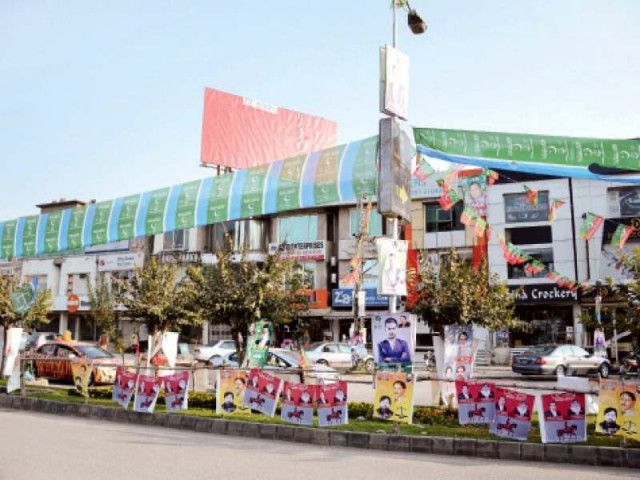Poll preparedness: What are you voting for tomorrow?
An explainer on how the local government will function

Streets, greenbelts and intersections in the capital are adorned with banners, flyers and hoardings of various political parties. PHOTO: HUMA CHOUDHARY/EXPRESS
The campaign season for the first-ever local government elections in the federal capital concluded here on Saturday.
Tomorrow (Monday), for the first time in the federal capital’s 55-year history, all urban and rural residents will have the chance to elect their own local political representatives.
The powers currently entrusted with the bureaucracy in Islamabad will devolve to the two-tier local government system.
Although the draft of the Islamabad Capital Territory (ICT) Local Government Act 2015 was hurriedly prepared and contains a number of lacunas and overlaps in powers, most political parties still consider it the ‘first step towards participatory democracy’.

They insist the shortcomings are primarily because no local government has ever functioned citywide and that they will be addressed once the system is in place.
LG system
Islamabad has an estimated population of 1.8 million, but only around 680,000 voters for its 50 union councils.
The two-tier local government system consists of union councils and a Metropolitan Corporation (MC).
In the first phase of the elections, voters would directly elect 600 representatives — 12 from each UC — while the second phase will see the elected representatives form a 66-member MC.
The MC will consisting of 50 elected chairmen from all UCs, and another 16 members who all the chairmen will elect directly. The MC will be headed by a mayor and three deputy mayors, who will be chosen from among the 600 elected representatives.
Local Government Act
The law bestows significant authority to the local government. However, the Capital Development Authority, which currently performs all municipal functions in Islamabad, will still have a major role.
The act says the CDA will remain responsible for overall planning, development and maintenance of the city master plan, but in case of a clash between the existing laws — the CDA Ordinance 1960 and Islamabad Capital Territory Zoning Regulations 1992 — and provisions of act, existing laws shall prevail.

In short, the local government will have to work within the existing framework and after taking permissions from the custodians of existing laws.
Then there will be a Chief Officer, appointed by the federal government, who will oversee the overall performance of the MC ‘under the supervision of the mayor’ and will directly report to the government.
Besides a chief officer, the federal government will also appoint a 10-member Local Government Commission comprising of a chairman, who will be a retired civil servant, two members each from the National Assembly and Senate, two technocrats appointed by the government, and three representatives of the Islamabad Capital Territory Administration.
The commission will conduct special inspections of the local government and play a role of bridge between the local and federal governments.
Overlapping powers
Several politicians and civil servants are perturbed over the issue of overlapping powers. The proposed local government will be entitled to approve building plans in Islamabad, but on the other hand the CDA will be responsible for enforcement of building bye-laws.
Whole department of the enforcement will be devolved to local government, but the enforcement of Master Plan rests with the CDA, who will have no force to enforce bye-laws.
The local government will collect municipal taxation but services like bulk water management and upkeep of water reservoirs will be the responsibility of the CDA. The Margalla Hills National Park will be the responsibility of the CDA, but upkeep of the environment in urban and rural areas will be the responsibility of the city government.
Published in The Express Tribune, November 29th, 2015.



















COMMENTS
Comments are moderated and generally will be posted if they are on-topic and not abusive.
For more information, please see our Comments FAQ